2022 Tribeca Festival (June 8th - June 19th)
Please click here to browse the Film Guide and to purchase tickets online.
Narratives
Please click here to read my exclusive interview with Andrew Bujalski, writer/director of There There.
88
Directed by Eromose

Femi Jackson (Brandon Victor Dixon) works as the Financial Director of One USA, a political action committee associated with the campaign of presidential candidate Harold Roundtree (Orlando Jones). One day, he notices that donations from two major campaign donors each have digits that add up to the number 88. His friend, Ira Goldstein (Thomas Sadoski), who happens to be a financial blogger, joins him to investigate what turns out to be a conspiracy that involves white supremacy.
88 suffers from the same systemic issue that the recent thriller On Sacred Ground suffers from: it squanders its opportunity to become a suspenseful and engrossing narrative. The screenplay by writer/director Eromose just seems to be going through the motions from plot point A to plot point B without breathing life into any of its characters. Femi has a wife, Maria (Naturi Naughton), who's pregnant, but their scenes fall flat and feel contrived. When it comes to exposition, though, the film does excel at that thanks to some clever and witty animation at the beginning that explains how PACs and political donors function, and how they're able to hide financial corruption. If only the rest of the film were as witty and clever. There's too much on-the-nose and stilted dialogue which leads the film to become lethargic. Once the plot veers into another direction when Ira tells Femi that 88 stands for "Heil Hitler" and that the financial corruption is associated with White Supremacy, that's around the time the film loses steam. It bites off more than it could chew while suspense dissipates, perhaps because that "big reveal" occurs too early, so there's nothing left that's even remotely as surprising or intriguing. Arlington Road is a better example of a paranoid conspiracy thriller that not only gradually ratchets up the tension, but also sees and treats its characters like human beings without being afraid to go headfirst into dark territory. Then there's the bold and brilliant political thriller The Manchurian Candidate. Many of Alan J. Pakula's films, especially All the President's Men, generated suspense effectively while keeping the audience emotionally involved in the characters' lives. That can't be said about 88 which pales by comparison.
Unfortunately, the performances are mediocre without rising above the weak, shallow screenplay. Besides the aforementioned animated sequence, not a single scene stands out. Moreover, the cinematography, lighting and editing don't create a tense or foreboding atmosphere; the film is brightly lit which makes it look like a made-for-TV movie or sitcom, minus the laughs. The pacing is fine at first before dragging a lot during the second act. At an overlong running time of 2 hours and 2 minutes, 88 is a lackluster, contrived and vapid political thriller that's not nearly suspense, emotionally engrossing or biting enough.
Number of times I checked my watch: 3 Released by Samuel Goldwyn Films. Opens February 17th, 2023 at Village East by Angelika. 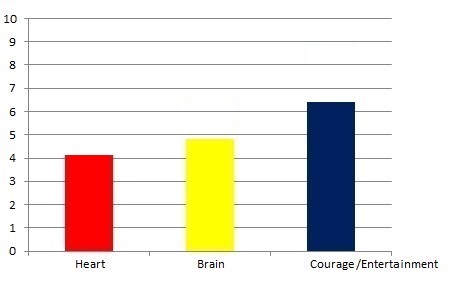
Acidman
Directed by Alex Lehmann
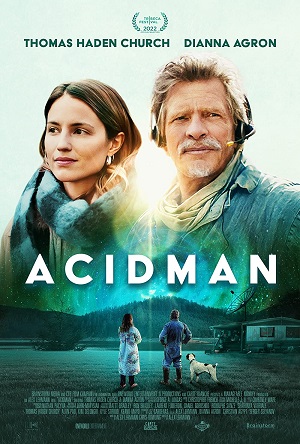
Maggie (Dianna Agron) travels to the Oregon wilderness to reconcile with her estranged father, Lloyd (Thomas Hayden Church), who's convinced that UFOs have invaded his land.
No, Acidman is not a superhero movie nor is it about a grumpy old man. The title refers to the word that vandals paint onto Lloyd's cabin. In the screenplay by writer/director Alex Lehmann and co-writer Chris Dowling, there's much more to Lloyd than meets the eye. He may seem a bit crazy and delusional at first, but the more that Maggie gets to know him, the more complex, relatable and, above all, human he becomes. The plot synopsis above is only what the film is about on the surface. Beneath the surface, fundamentally, it's about two flawed people who gradually see each other as human beings with compassion and empathy. Maggie and Lloyd are very different in terms of their personality, but they're much more similar than they think when they initially reunite. It's fascinating and genuinely moving to observe the evolving dynamics of their relationship and to watch them grow closer to each other while they find common ground. They not only talk, but also listen to each other and show signs of introspection. Although the film takes place in the middle of the woods, it's not a horror film like most films set in the woods are---there are no monsters or cocaine bears here. There are no villains in the film either unless you count the delinquents who mock Lloyd and vandalize his home. Acidman doesn't become a movie about Lloyd confronting his bullies; he confronts his inner demons while bonding with his daughter instead. To be fair, the sci-fi subplot involving Lloyd's obsession with UFOs isn't even remotely as interesting as the main subplot. Fortunately, the filmmakers don't focus too much on that subplot nor do they veer into any unnecessary tangents. They also avoid schmaltz, melodrama, clunkiness and the use of flashbacks to tell the story, so the screenplay feels organic with just the right amount of exposition.
Acidman is very lucky to have Dianna Agron and Thomas Hayden Church because they're both talented actors who bring warmth, charisma and emotional truth to their role. For the entire duration of the film, you forget that you're watching two actors; you actually believe that they're father and daughter which is a testament to how natural their performances are. Neither of them under-acts or over-acts. Dianna Agron has a few quietly moving scenes that convey a lot of emotion without words. The film moves at just the right pace and knows when to slow down. Even though you can see the ending from a mile away, it's all about the journey to that end point that truly matters. At a running time of 1 hour and 27 minutes, Acidman is a tender, heartfelt and captivating emotional journey.
Number of times I checked my watch: 2 Released by Brainstorm Media. Opens March 31st, 2023 in select theaters and on VOD. 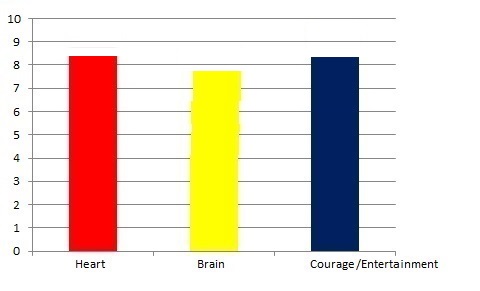
Alone Together
Directed by Katie Holmes
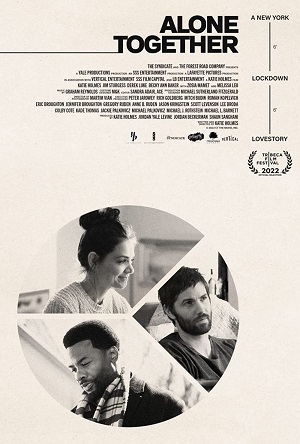
June (Katie Holmes), a food critic, lives in New York City with her boyfriend, John (Derek Luke). When the pandemic strikes, John books an AirBnb for them to escape to upstate New York together. When she arrives there separately from him, she's surprised to see another guy, Charlie (Jim Sturgess), double booked at the AirBnb. He lets her stay there. Little does June know that the pandemic will last more than just a few weeks and that she and Charlie will have a lot of time to bond while John visits his parents.
Alone Together is yet another romantic drama about two strangers who fall in love within a short period of time together. A premise like that could work if the characters are believable or if the chemistry between them can be felt. Unfortunately, neither happens to be the case in the bland screenplay by writer/director Katie Holmes. Almost everything happens the way you expect it to once June meets Charlie. There are too many coincidences from the get-go. Her Lyft driver happens to be a very nice and friendly man who gives June hand sanitizer that she couldn't find back in the city. In one of the many examples of poor exposition, she sees horses during the drive upstate and suddenly comments out loud that she hasn't seen horses since she was a child. That's the little that you learn about June's childhood, but her love of horses isn't mentioned again, so what's the purpose of that comment? She clearly loves her grandpa who's suffering from Alzheimer's. Charlie clearly loves and misses his mother (Melissa Leo). The dialogue sounds too on-the-nose with no room for interpretation about what the characters are thinking or feeling. Also, June comes across as an insecure, paranoid bitch for cheating on her boyfriend behind his back while suspecting him of cheating on her when he's just caring for his parents. If she were to dump him before sleeping with Charlie, that would be reasonable, but she doesn't. Meanwhile, you're expected to want her and Charlie to be together. She's head-over-heels into him and sees him through rose-tinted glasses. He seems too good to be true and, coincidentally, he happens to be more supportive of her true self than her John is---i.e., John discourages her passion for being a food critic and her dreams of being a writer. She feels happier around Charlie, but is she not emotionally mature enough to realize that they're in their "honeymoon phase" of the relationship? Also, would it hurt for the screenplay to include just a little bit of wit and comic relief? Without it, it leads to monotony and tedium.
What makes no sense is why Charlie would want to be in a relationship with a woman who cheats on her boyfriend after his ex-girlfriend was a serial cheater. He even admits that fact about his ex to June. Before you know it, they profess their love of one another, even after John arrives and confronts June about the stranger she'd been living with without telling him. Briefly, June returns to John and leaves Charlie behind making it seem like he meant nothing to her. Soon after, she suddenly changes her mind. She still seems like an emotionally needy, insecure bitch by the end, so there's no real character arc for. She doesn't even have remorse for her infidelity, so the third act, which tries too hard to be uplifting, does not, in any way, shape or form, earn its uplift. Based on what perceptive audiences can discern from June's past behavior with John, it wouldn't be beneath her to cheat on Charlie once that relationship goes south. Unfortunately, Alone Together is too stuck in a land of fairy tales to even acknowledge that harsh fact.
The performances are fine, with no one giving a bad performance, but the screenplay's poorly developed characters don't allow anyone to really shine. Melissa Leo briefly shows up as Charlie's loving mother, but the role just seems to exist to show later on how kind Charlie is to her. Again, he seems too good to be true as though he were a "knight in shining armor" for June. The best romantic dramas about strangers meeting and falling in love, like Before Sunrise, remain grounded in realism with fully-fleshed characters. Alone Together, at a running time of 1 hour and 38 minutes, is mildly engaging, but often contrived, hackneyed and witless.
Number of times I checked my watch: 3 Released by Vertical Entertainment. Opens July 22nd, 2022 at Angelika Film Center. 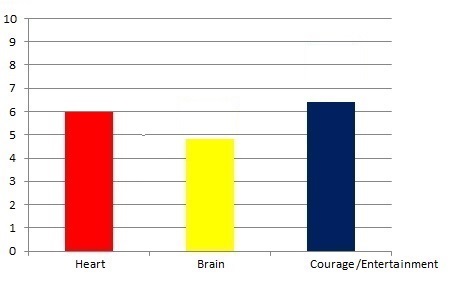
The Black Phone
Directed by Scott Derrickson
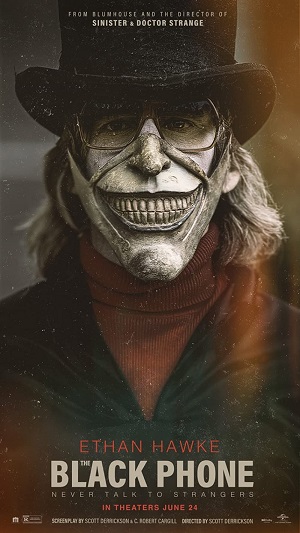
13-year-old Finney (Mason Thames) lives with his alcoholic, physically abusive father, Terrence (Jeremy Davies), and younger sister, Gwen (Madeleine McGraw). At school, he encounters bullies. Kids mysteriously disappear around town, and, soon enough, Finney becomes one of them when The Grabber (Ethan Hawk) kidnaps him and traps him in a soundproof basement with only a black phone on the wall. The Grabber's previous victims call Finney and help him to plan an escape.
Like Malevolence, The Black Phone begins with one villain, Finney's father, only to introduce yet another villain, The Grabber, who's far worse. The screenplay by writer/director Scott Derrickson and co-writer C. Robert Cargil sees and treats them as villains, not as human beings, because they fail to include much character depth or any backstore. Why does Finney's father abuse his kids? Why does The Grabber kidnap, torture and kill kids? That's left up for the audience to interpret on their own. The Grabber isn't a very interesting or memorable villain. He's menacing, cruel, sadistic and wears several creepy masks, but what point is he trying to make? Even Jigsaw from Saw had a reason for kidnapping and killing his victims. Perhaps The Grabber was abused as a child himself and takes pleasure from making others suffer as well. Who knows? The Black Phone spends too much time with exposition to get to the meat of the story: Finny trapped in the basement while communicating with the ghosts of his abductor's previous victims. Until that point, you learn about Finney's abusive life at home and in school. There's so much abuse, depravity and unflinching in the film, but it's afraid to explore its dark themes beneath the surface. It also tried too hard to make the audience laugh during the brief moments of comic relief, i.e. by having Gwen curse at police officers. Her use of profanity is only funny because it comes out of the blue.
Some of the kills are easily telegraphed, i.e. when one of the characters opens the basement door and sees Finney, you just know that The Grabber is somewhere around the corner and will kill that character at any moment. So, it's not surprising at all when it happens 10 seconds later. The third act feels rushed and, again, fails to treat any of its characters like human beings given the traumatic events that they've just experienced. Then you're also supposed to assume that Finney's dad completely changed from an emotionally and physically abusive parent to repentant, non-abusive parent all-of-a-sudden. Abusers don't change so quickly, so the beat with Finney's dad begging for forgiveness to Finney on his knees while crying doesn't land, and the film doesn't earn its upbeat ending. Perhaps there's a darker version of The Black Phone with a more bitter and bold ending, but the ending this version plays it seems like a toothless, contrived cop-out.
The kid actors are all decent with Madeleine McGraw giving the stand-out performance among the bunch. Ethan Hawk plays against type as The Grabber. It's refreshing to see him play such a despicable character unlike anything he's played before, but, concurrently, it's a shame that the shallow screenplay doesn't let him display his full range of acting skills. The pace is uneven with a slow beginning and then it picks up in the second act before the even more fast-paced ending. The practical effects of the blood makes it look realistic, but it's not a slatter-fest with lots of blood-and-guts and disgusting scenes like some of those torture-porn or exploitation films from the 2000's and 1970's, i.e. The Texas Chainsaw Massacre or The Last House on the Left. At a running time of 1 hour and 40 minutes, The Black Phone is a tedious, contrived and undercooked amalgam of crime thriller, sci-fi, drama and horror.
Number of times I checked my watch: 3 Released by Universal Pictures. Opens June 24th, 2022 nationwide. 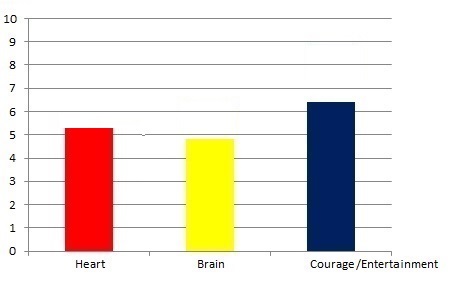
Cha Cha Real Smooth
Directed by Cooper Raiff

Andrew (Cooper Raiff) still lives with his mother (Leslie Mann), stepdad (Brad Garrett) and his 13-year-old brother, David (Evan Assante), while struggling to earn a living at a fast food restaurant. When he gets offered a job as a motivational dancer, a.k.a. a party starter, at bar at bat mitzvahs, he seizes the opportunity to make more money. At one of the parties, he meets Domino (Dakota Johnson) who has an autistic teenage daughter, Lola (Vanessa Burghardt), and a workaholic fiance, Joseph (Raúl Castillo). Andrew hits it off with Domino, she hires him to babysit her daughter, and, soon enough, she has a romance with him.
After hitting it out of the ballpark with his first film, Shithouse, writer/director Cooper Raiff does it again with Cha Cha Real Smooth. Raiff has a knack for writing dialogue that sounds natural. With a less sensitive screenplay, the plot could've turned into a cheesy soap opera or a romantic thriller or a contrived sitcom. Instead, it's about flawed human beings searching for something meaningful and fulfilling in their unfulfilling lives. Domino and Andrew's "meet cute" moment is sweet without being saccharine. He impresses her by convincing her daughter to get up and dance at a bar mitzvah. The audience doesn't hear what he whispers to her, though, that convinced her to dance, but that mystery will be revealed later on in the film, so be patient. Andrew doesn't think twice before pursuing Domino even though she has a fiance. Her relationship with Joseph is much more complicated as are her feelings toward him. He doesn't seem like an abusive husband. He's often working out of town which leaves Domino plenty of time to be alone. She's clearly lonely, and the same can be said about Andrew. How their relationship evolves feels true-to-life and allows for both of them to have epiphanies. They're both struggling to make sense of their emotions, so they're still growing up. Without spoiling any of the surprises, they both have different interpretations of their relationship. The way that Domino expresses her feelings to Andrew in the car in a key scene toward the end shows that she has compassion, vulnerability, empathy and remorse. Andrew has a lot of growing up to do as does Domino, but Domino seems to be more self aware and introspective than Andrew.
There's no villain in this film nor are their saints for that matter. The characters are all flawed human beings which makes them all the more relatable. Their character arcs also feel organic. Writer/director Cooper Raiff doesn't ask you to judge them nor does the film judge them; instead, you're asked to experience them. He does keep a generally light tone, although there are a few scenes that are slightly darker while adding emotional depth, but there's nothing emotionally devastating or too heavy. There's also just the right amount of comic relief and witty dialogue without anything going over-the-top or appealing to the lowest common denominator.
Cooper Raiff gives a solid performance with great comedic timing while finding the emotional truth of his role. Dakota Johnson is just as radiant as she is in Our Friend. She brings a lot of warmth and charisma to her role. Vanessa Burghardt gives a breakthrough performance as Domino's autistic daughter. The film's emotional depth comes from both the performances and from the screenplay which is a testament to Cooper Raiff's skills as a writer, director and actor. At a running time of 1 hour and 47 minutes, Cha Cha Real Smooth is warm, tender and wise with just the right balance of humor and heartbreak.
Number of times I checked my watch: 1 Released by Apple Plus. Opens June 17th, 2022 at Angelika Film Center. 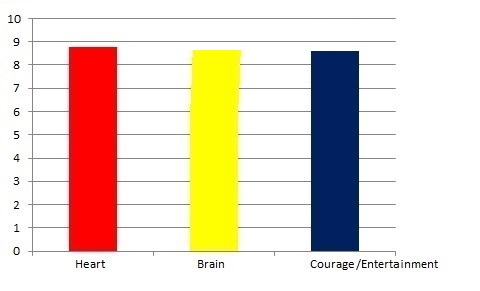
Cherry
Directed by Sophie Galibert

When 25-year-old Cherry (Alex Trewhitt) learns that she's almost 11-weeks pregnant, she has 24 hours to decide whether or not to have an abortion. She loses her job at a costume store, and her boyfriend, Nick (Dan Schultz), remains unsupportive when she tells him the news that she's pregnant. As the deadline to make the decision approaches, she spends time with her mother, Carla (Angela Nicholas), sister, Anna (Hannah Alline), grandma (Melinda DeKay), and estranged father, Bob (Charlie S. Jensen).
The screenplay by writer/director Sophie Galibe and co-writers Arthur Cohen and Anne-Claire Jaulin is a heartfelt, witty and captivating coming-of-age story about a young woman at a major turning point in her life. Cherry has a lot of emotions to sort through upon discovering that she's nearly 11 weeks pregnant. She feels confused, frustrated and lost. Fortunately, Cherry's estranged father, Bob, who works as a mechanic isn't written as a villain. There's a simple, yet poignant scene where they eat from a fruit stand together. She does confront him about the fact that he barely knows her or who her latest boyfriend is, but the confrontation doesn't lead to a bitter fight. Cherry doesn't resort to violence or melodrama to generate dramatic tension. It also balances the heavy topic of abortion with just the right amount of comic relief, i.e. when Cherry confides in her grandmother that she's pregnant, her grandma mistakenly thinks that it's not the first time that she's pregnant. Cherry attempts to tell her mother and sister during a dinner the news that she's pregnant, but she decides not to when her sister announces that she's infertile. It's an awkwardly funny scene that's also very revealing about Cherry's insecurity, compassion, fear and emotional immaturity.
What's more complicated, though, is the relationship between Cherry and her boyfriend who doesn't help her during these tough times. It'd be reasonable to label him as an insensitive jerk at first, but there's more to him than meets the eye, so don't be quick to judge him. It's hard to tell, though, if he truly changed by the end of the film or if their relationship will be able to be salvaged. Will he make for a good father? A good husband? That's up to the audience to decide and imagine based on their own projections and experiences. That subplot is the one that remains underdeveloped, so it's a missed opportunity to add more emotional depth and realism to the film. The third act ends on an uplifting, yet understated note while briefly breaking the 4th wall in a way that's witty and amusing without tying everything neatly in a bow. Cherry does, indeed, earn its uplift.
Alex Trewhitt gives a radiant and moving breakthrough performance as Cherry. She handles the emotional complexities of her role very convincingly while also displaying great comedic timing. Much of the film's emotional resonance comes from her performance, not from the screenplay. The pace moves briskly enough, the soundtrack is lively with well-chosen music, and the cinematography makes the film more cinematic. Moreover, the filmmakers should be commended for keeping the running time under 90 minutes. They grasp that the best kind of stories are the ones where you leave the audience wanting more, not less.
Number of times I checked my watch: 2 Released by Entertainment Squad. Opens April 14th, 2023 in select theaters. 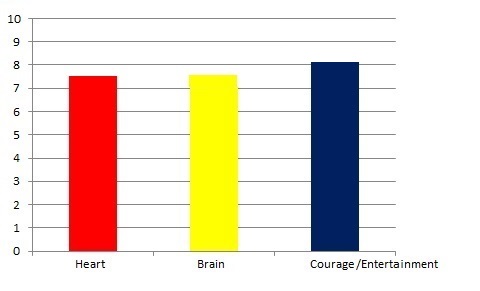
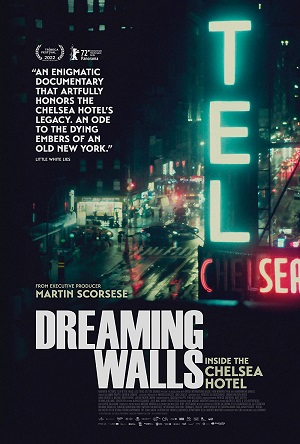
Dreaming Walls: Inside the Chelsea Hotel lives up to its title, but only in the literal, most superficial sense. Co-directors Maya Duverdier and Amélie van Elmbt bring viewers inside the iconic Chelsea Hotel as it undergoes renovation while longtime residents, many of them artists, refuse to move. The filmmakers opt for a laidback, laissez-faire approach similar to the fly-on-the-wall filmmaking style of Frederick Wiseman. They include footage of the residents as well as the staff who work at the hotel, so in that way, this doc is fair and balanced. Unfortunately, it states the obvious about the hotel without being profound, moving or revealing enough. Anyone who looks up Chelsea Hotel on Google would be able to learn about what makes it so iconic, or at least what made it iconic in the past: it's where artists/bohemians converge while paying very cheap, affordable rent in the heart of Chelsea. Not surprisingly, the residents who refuse to move fear that their rent will increase to the market rate for the area. The closest that the doc gets to insight comes from Rose Cory who makes the astute observation that artists can make art with very little money, and that the Chelsea Hotel helped those struggling artists. The filmmakers squander their opportunity to explore and expand that kernel of wisdom deeper, though, or to allow the audience to get to know the residents as human beings beyond just what their apartment looks like. At a running time of 1 hour and 20 minutes, which feels more like 2 hours, Dreaming Walls: Inside the Chelsea Hotel is a tedious, shallow and underwhelming documentary. It opens on July 8th, 2022 at IFC Center via Magnolia Pictures.
Family Dinner
Directed by Peter Hengl
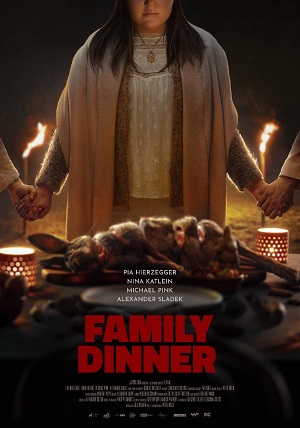
Simi (Nina Katlein), an overweight 15-year-old, spends Easter weekend at the home of her aunt, Claudia (Pia Hierzegger), a nutritionist, to begin the process of losing weight. Claudia lives with her husband, Filipp (Alexander Sladek), and son, Filipp (Alexander Sladek).
Family Dinner is a prime example of "elevated horror." The audience knows that something isn't right about Claudia and the abusive way that she treats Simi. Why is she behaving that way? What's the matter with Filipp and the way that he's behaving, too? The screenplay by writer/director Peter Hengl takes its time to unravel the truth about Claudia's true intentions. Until the big reveal in the third act, Family Dinner will keep you guessing to try to figure out what's going on. There's a very chilling nightmare sequence that won't be revealed here. Hengl does a great job of escalating the suspense gradually while keeping the audience emotionally engaged in the character of Simi. You'll root for her from start to finish. Once the film veers into more palpable horror and thrills, it's unflinching and terrifying without holding back on the darker elements. There's not much comic relief, so if you like your psychological horror films to be relentlessly intense and disturbing, you'll be satisfied with Family Dinner.
Do keep in mind, though, that there are a few stomach-churning scenes with gore, but not too many. This isn't the kind of film that relies on blood, guts, gore or even jump scares to entertain the audience. Nina Katlein gives a moving performance in the lead role as does Pia Hierzegger. All of the performances are natural which makes it easier to be engrossed in the narrative. The pace doesn't move too quickly nor too slowly, and there's no choppy editing either. Nor does the filmmaker rely on the music score to scare the audience. The horror comes from the audience's imagination, from the story, the creepy character and the lighting as well. At a running time of 1 hour and 37 minutes, Family Dinner is a taut, moving and creepy psychological horror film.
Number of times I checked my watch: 1 
A Love Song
Directed by Max Walker-Silverman

Faye (Dale Dickey), lives a quiet life in a trailer on a campground by a lake in rural Colorado. She fishes, drinks coffee and occasionally interacts with a gay couple, Marie (Benja K. Thomas) and Jan (Michelle Wilson), living in a trailer nearby. The mailman, Sam (John Way), might soon give her a letter from a former lover, Lito (Wes Studi), whom she had written to and hopes to receive a reply from him. When Lito shows up in person, he and Faye reconnect and reminisce about their past together.
The plot synopsis above doesn't do A Love Song any justice because it's much more than just about its plot. Writer/director Max Walker-Silverman keeps the plot as well as the exposition at a bare minimum. He grasps the concept that less is more and that understatement can be a powerful way of connecting with the audience on an emotional level. When you first meet Faye, you don't know much about her, but if you pay close attention to what she says as well as her body language during the quieter scenes, you'll be able to discern a lot about her without any voice-over narration. She's taciturn which makes her all the more interesting. There's probably some sadness, regret, yearning and emotional pain inside of her. After all, she's human, so kudos to writer/director Max Walker-Silverman for seeing and treating her like a human being. Every scene rings true, even the ones where she briefly talks to her neighbors or to her mailman. She patiently and eagerly waits for someone special from her past, but it's not quite clear right away who that person is exactly until he shows up. Once he does arrive, the movie becomes a charming, quietly moving and refreshingly un-Hollywood romance. Patient audiences will be rewarded the most. Some movies are like a slice-of-cake while others are like a slice-of-life. A Love Song is an engrossing slice-of-life like the films of David Lean and Richard Linklater that sweep you away from the first frame until the very last frame.
Dale Dickey gives the best performance of her career as Faye. She conveys so much emotion without words which is a testament to her skills as an actress, to her emotional generosity, and to the ability to see and treat Faye as a human being. Thanks to her raw, emotionally honest, nuanced performance, the audience can sense an inner life inside of Faye. She begins as a stranger to the audience, but by the end, Faye feels like a fully-fleshed human being who you were happy to meet and get to know. Dickey brings so much warmth to her role. It's so wonderful to see such a complex role for women as well as for older actors. That's something very rare these days. Wes Studi also impresses with his warm and moving performance. No one over-acts or underacts. This is the kind of movie where you forget that these are people acting and that there's a screenplay because it's so seamless and true-to-life. You don't feel the wheels of the screenplay turning like in the overrated, contrived, sugar-coated and overlong Nomadland. The breathtaking scenery and landscape becomes a character in-and-of itself while adding some visual poetry, but this movie is so much more than just picturesque scenes of nature. Most importantly, it's about human nature. At a running time of merely 1 hour and 21 minutes, A Long Song is a triumph. It's a warm, poetic and genuinely heartfelt emotional journey well worth taking.
Number of times I checked my watch: 1 Released by Bleecker Street.Opens July 29th, 2022 at Angelika Film Center and AMC/Loews Lincoln Square. 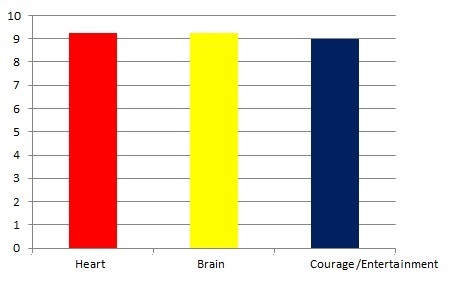
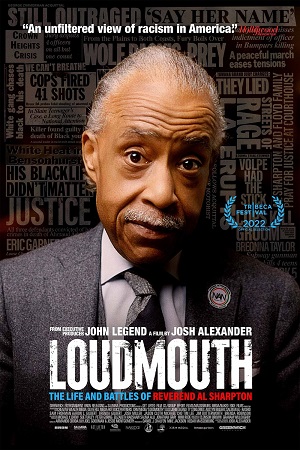
Everyone has a life backstage and front stage, as socio-psychologist Erving Goffman once wisely observed. A truly great documentary biopic captures both while huamizing its subject.Loudmouth, a doc about Reverend Al Sharpton, shows what he's like frontstage while charting his rise to fame and his involvement in the civil rights movement throughout the years. During the contemporary interviews with him, he seems to be putting on a performance, so he remains frontstage. Director Josh Alexander does a decent job of combining interviews with Sharpton and archival footage to help the audience understand what makes him integral in the civil rights movement. However, he fails to humanize Sharpton or to show more of what he's like "backstage." Sharpton is smart, brave and determined, but, like all human beings, he has flaws. Loudmouth minimized and overlooks his flaws which makes it feel like he's being put on a pedestal. You'll learn very little that's new or surprising about Al Sharpton. Also, the 2 hour running time does feel overlong, although the film is slickly edited and fast-paced enough so that there aren't any parts that drag too much. Without being a warts-and-all doc, Loudmouth is ultimately hagiographic, underwhelming and incomplete. It opens December 9th, 2022 in select theaters via Greenwich Entertainment.
Nude Tuesday
Directed by Armagan Ballantyne
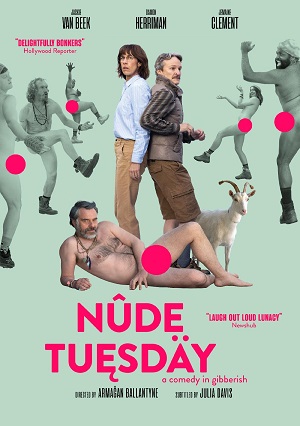
Laura (Jackie Van Beek) and her husband, Bruno (Damon Herriman), go to a couples retreat together in hopes of saving their marriage. At a retreat, the leader, Bjorg (Jemaine Clement), has to go through a series of bizarre exercises.
The first movie in the language of Gibberish, Nude Tuesday is an outrageously hilarious, campy and surprisingly heartfelt comedy for adults. Like most comedies it begins with a tragedy. Laura and Bruno's marriage has gone stale, so the couples retreat might be their solution. Even though the ending can be seen from a mile away, the journey there is a lot of fun. The screenplay by Jackie van Beek includes some visual gags, dark humor and a lot of offbeat humor. Most of the humor lands. Bjorg seems like an over-the-top caricature, but if you're patient enough to wait until the third act, you'll see that he's more than just off-the-wall guru. The humor and general tone feels similar to the humor and tone found in the films of Dominique Abel, Bruno Romy and Fiona Gordon like L'Iceberg, The Fairy and Lost in Paris. It's not quite as laugh-out-loud funny or bold as the cult classic sex comedy Eating Raoul, but it almost reaches that level of hilarity and campiness at times. Most important, Nude Tuesday knows when to take itself seriously and ground itself in humanism. It's fundamentally about how married couples rekindle their affection toward each other albeit with some assistance. By the end of the film, they grow, learn and change in ways that they didn't expect to before the retreat. The third act, which won't be spoiled here, has just the right blend of comedy and poignancy which aren't easy elements to combine.
The superb cast all have great comedic timing, especially Jackie Van Beek, Damon Herriman and Jemaine Clement. Much of the film's emotional depth comes from Jackie Van Beek and Damon Herriman's performance. They breathe life into their role as husband and wife which helps you to believe that Laura and Bruno are indeed a couple. The actors aren't brave for being naked physically; they're brave for their emotional nakedness which is even more intimate in front of the camera. At a running time of 1 hour and 40 minutes, it would make for an interesting double feature with another bold and unconventional movie about a marriage on the rocks, Eyes Wide Shut.
Number of times I checked my watch: 1 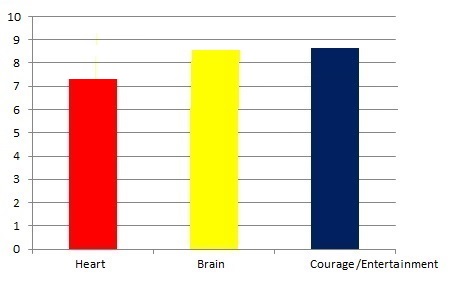
Official Competition
Directed by Gastón Duprat and Mariano Cohn

Humberto (José Luis Gómez), a millionaire nearing his 80th birthday, wants to be remembered for producing a great film. He hires Lola Cuevas (Penélope Cruz) to direct it. Lola casts actors for the two roles in the film: Iván Torres (Oscar Martínez) and Félix Rivero (Antonio Banderas). The two actors' egos and acting methods clash as they meet with Lola to rehearse for the film.
Official Competition is one of the most wickedly funny satires of the film industry since The Player and What Just Happened. The screenplay by co-writer Andrés Duprat along with co-writers/directors Gastón Dupra and Mariano Cohn brims with wit, tongue-in-cheek humor and a few surprises up its sleeve. They establish the tone right away merely by the way they introduce Lola Cuevas with her over-the-top, curly hair that's just as quirky and over-the-top as her personality. Lola comes acorss as a director who's difficult to work with, yet clever, talented, awkward and unpredictable. The fact that she casts two actors who are very different from one another in many ways shows that she's not afraid to take risks. Although many scenes are indeed funny and even silly at times, they're always grounded in a harsh truth about human nature, art and the filmmaking industry. Félix Rivero, a huge international star, behaves like a diva more often than not. He's an asshole and a narcissist with no shame in hurting others emotionally or lying. For example, when he points to a woman standing outside of the building, he criticizes her looks and says that she's probably Lola's lesbian lover. He's wrong, though, because a few seconds later, Iván introduces her as his wife, so Félix managed to offend both his co-star and Lola simultaneously. Does he show any remorse or accountability? Nope. Does that make him likable? Nope, not even remotely. So what? It's amusing to watch him bicker with Lola and Iván. The more time that Félix and Iván spend with each other, the more they get on each others' nerves. What Lola does to them in the second act is even more abusive, but she has a point to make and so does the film. The way that she makes that point makes her just as unlikeable as Félix. Something happens later in the second act that adds a dark twist which won't be spoiled here, but that twist, despite how contrived it may seem, also has a purpose when it comes to what it says about actors' limitless egos and the sacrifices that they make for the sake of art.
Penélope Cruz, Antonio Banderas and Oscar Martínez have great chemistry together and, more importantly, terrific comedic timing. They're clearly having a lot of fun in their roles, and, fortunately, the audience has some fun watching them concurrently. A large part of the film's successful blend of tone comes from terrific cast who know how and when to go over-the top so that the audience knows not to take the scenes too seriously. Their charisma is also palpable from start to finish. They somehow make these mostly unlikable characters a lot more tolerable than you would think they'd be given their descriptions above. With less talented actors, they would've been like nails on a chalkboard. At a running time of 1 hour and 55 minutes, Official Competition is a bold, provocative and razor-sharp satire.
Number of times I checked my watch: 1 Released by IFC Films. Opens June 17th, 2022 at IFC Center. 
Vengeance
Directed by B.J. Novak
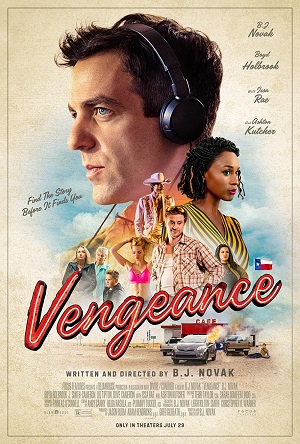
Ben Manalowitz (B.J. Novak) works as a writer for The New Yorker and aspires to become a podcaster. Ty Shaw (Boyd Holbrook), the brother of a woman named Abby who recently died, believes that Ben is Abby's boyfriend, so he called Ben in the middle of the night to inform him about Abby's death and to invite him to the funeral in Texas. Abby isn't Ben's girlfriend, though, but he still travels all the way to Texas to attend the funeral. Ty, Abby's brother, believes that Abby's death wasn't an accident; it was murder. Ben hopes that he can use the investigation of Abby's death as a story for a podcast. Eloise (Issa Rae), a podcast producer, gives him the green light, so he reports back to her every day while interviewing and recording Ty and his family, including his mother, Sharon (J. Smith-Cameron), younger brother, Mason (Eli Bickel), younger sisters, Paris (Isabella Amara) and Kansas City (Dove Cameron), and grandmother, Carole (Louanne Steph). Ben also meets Abby's record producer, Quintin Sellers (Ashton Kutcher).
Vengeance is a yet another genre hybrid that works for a while before taking a nosedive and running out of steam. Writer/director B.J. Novack combines dark comedy, fish-out-of-water comedy, and satire with a slow-burning crime thriller. He pokes fun at Texans like the Coen brothers poke fun at people from North Dakota in Fargo. Some of the humor lands, like when Ben asks Paris how she takes her coffee and she replies, "Uhh..in my mouth.", while looking confused. Then there's a funny sequences where Ben gets the run around from authority figures who keep giving him the runaround and pointing him in another direction when he tries to interview the person responsible for the jurisdiction where Abby was murdered at. The deeper that Ben gets into the mystery of Abby's death, the more that it points to foul play and a cover-up. Unfortunately, when, Vengeance tries to get darker and more serious during the third act, i.e. when somehow tries to blow up Ben's car, it begins to take the aforementioned nosedive while becoming increasingly convoluted and contrived. Something that happens toward the end, which won't be spoiled here, is indeed dark, shocking and twisted, but completely out-of-character for one of the characters who you thought you knew and liked. Those last few minutes leave too many questions which the film doesn't bother to explore. If you can imagine a darker, but less clever and plausible version of Knives Out, you'll get something along the lines of Vengeance.
There's nothing exceptional about the cinematography, the music, the lighting or the set design. It's all pretty average and forgettable. The same goes for the performances which are just fine. Ashton Kutcher has a lot of fun in his role as Quentin, though, and makes the most out of his brief screen time. To be fair, there are some pacing issues, especially during the third act that moves too quickly because, until then, the film is mostly a slow-burn. At a running time of 1 hour and 34 minutes, Vengeance is mildly entertaining and occasionally funny, but increasingly convoluted, contrived and implausible while running out of steam.
Number of times I checked my watch: 3 Released by Focus Features. Opens July 29th, 2022 nationwide. 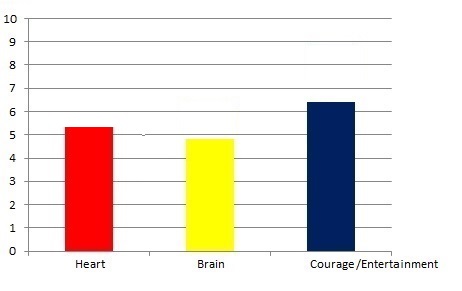
Documentaries

Beba is partially an autobiographical documentary about Rebeca "Beba" Huntt and partially a psychological examination of her and her family. Directed by Rebeca Huntt herself, it's an emotionally-charged roller coaster ride, but the audience has a sense of voyeurism as they peer into the lives of these ordinary people. She comes from a dysfunctional family with a history of abusive behavior and traumatic events which she traces back to the time when her father moved from the plantations of the Dominican Republic to an apartment in New York City when he was a boy. Huntt is in the process of trying to understand her family's past while trying to heal from it. As the saying goes, if we don't look at the past, how will we ever learn from it? Beba deals with a lot of emotional baggage and family scars that shape the person that Beba is today.
What's sorely missing, though, is an outside perspective which would've distanced the filmmaker from her subject. That distance is essential because, otherwise, it seems like home videos or navel-gazing. Beba suffers from both of those pitfalls despite how well-edited the film is. Through the stylish cinematography and some interesting uses of metaphors, Huntt makes the film more cinematic and even poetic. Poetry is often a form of protest, but it's unclear what the documentary is really a protest for or against. All families have a history and scars, some more visible and better-healed than others. To be fair, occasionally the film's visual style overtakes its substance when less style and more intimacy as well as depth would have been useful. At a running time of just 1 hour and 19 minutes, Beba is revealing and candid, but often over-edited and not nearly as moving or powerful as Capturing the Friedmans and The Wolfpack. It opens June 24th, 2022 at IFC Center via NEON.
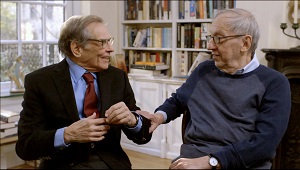
Turn Every Page is a provocative, moving and very well-edited documentary about author Robert Caro and his editor, Robert Gottlieb. Director Lizzie Gottlieb, the daughter of Robert Gottlieb, does a great job of introducing the audience to these 2 legends in the literary world. The docu isn't just about these two men; it's about their relationship over the span of 50 years. Caro wrote the biographies of Lyndon B. Johnson and Robert Moses. You'll learn how Gottlieb ended up as his editor, what his childhood was like and what it was like for him to work with Robert Caro. Turn Every Page covers a lot of ground in a way that's never confusing, exhausting or dull. That feat alone takes great editing to accomplish. If you're not familiar with the books that Caro wrote, you'll learn a little about those as well. There's also some humorous moments that provide some levity like when Caro, Gottlieb and others talk about what they think is the correct way to use a semicolon; they don't agree on one clear-cut way to use it. Most importantly, though, director Lizzie Gotlieb humanizes her father and Caro through the candid talking-head interviews with both of them. Robert Gottlieb even has a brief moment when he nearly tears up in front of the camera. He comes across as warm, charismatic and very, very intelligent as well as articulate. The same can be said about the equally-brilliant Robert Caro. At a running time of 1 hour and 52 minutes, which flies by like 90 minutes, Turn Every Page is captivating, illuminating and heartfelt. It will open TBA via Sony Pictures Classics.
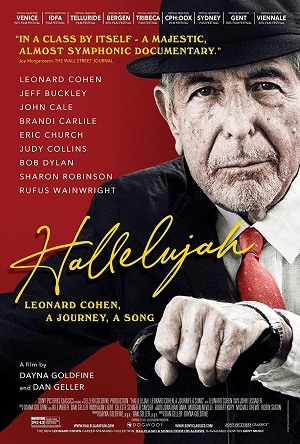
Hallelujah: Leonard Cohen, a Journey, a Song is an exhilarating and insightful documentary biopic about Leonard Cohen and his song "Hallelujah." Co-directors Daniel Geller and Dayna Goldfine combine archival concert footage, archival interviews with Leonard Cohem, audio recordings of interviews, and contemporary interviews with musicians and record producers. You'll even see interviews with Leonard Cohen rabbi, Mordecai Finely. The documentary charts Cohen's life chronologically from his childhood to his rise to fame, his fall from fame and then his comeback until his death. They don't shy away from including some of his emotional struggles as well as financial struggles, i.e. when his $5,000,000 pension was pilfered later in his life. Geller and Goldfine capture Cohen's palpable charisma. In the archival interviews, he seems bright and very zen---not surprisingly, he joined a Zen Buddhist monastery in 1994. Even at the monastery, he still managed to write songs. His good friend and collaborator, Judy Collins, makes a list of adjectives that describe precisely what made him stand out to her. One of those adjectives she lists is that he's mysterious which is a very perceptive observation.
As an interviewee wisely admits, the song "Hallelujah" is open to interpretation. What makes it so special is that Leonard Cohen used a word, hallelujah, that usually has religious connotations, and brought it back down to Earth for the masses. Other musicians, i.e. Jeff Buckley, sang their own version of the song. Shrek used the song, too, but omitted the lyrics that aren't meant for kids to hear. Cohen does get asked at one point to comment on all of the different versions of his song from different music artists. His answer won't be spoiled here, though. Perhaps the most profound statement comes from someone who says that it's an insult to the artist to ask him or her to explain his art. He makes a good point albeit it's a harsh truth that's a lot to process. When it comes down to it, Leonard Cohen's songs speak for themselves. They're transcendant beyond words. The same can be said about Cohen's charisma. Hallelujah: Leonard Cohen, a Journey, a Song provides a glimpse into Loenard Cohen's heart, mind and soul. It opens at Film Forum on July 1st, 2022 via Sony Pictures Classics.
Space Oddity
Directed by Kyra Sedgwick
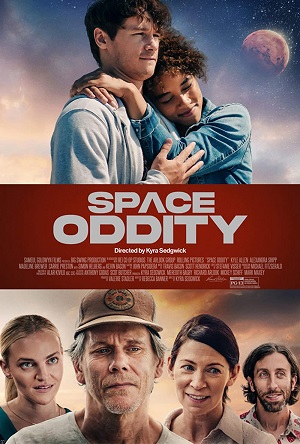
Alex McAllister (Kyle Allen), an engineer, lives with his mother, Jane (Carrie Preston), father, Jeff (Kevin Bacon), and sister, Liz (Madeline Brewer), on a farm, while still grieving the death of his brother. He's determined to travel on a mission to Mars and to help colonize it. He romances Daisy (Alexandra Shipp), who happens to be his insurance agent assisting him with his finances as he prepares for the mission.
Space Oddity is yet another overstuffed, undercooked and clunky dramedy that's ultimately less than the sum of its parts and that feels like a made-for-TV movie. The screenplay by Rebecca Banner tries to tackle the important, relatable issues of grief, love and the power of the imagination, but it does so while barely scratching the surface and without anything truly insightful to say. Also, the plot meanders too often and feels unfocused as it juggles Alex's plans to join the one-way mission to Mars, his relationship with his sister, and his romance with Daisy. Very few scenes actually ring true. The moments with him and Daisy from the very first time they meet feel corny and contrived. He barely even gets to know Daisy before she becomes his love interest. Their romantic subplot seems like it's straight out of a cheesy Nicholas Sparks romance, and you can see the ending from a mile away. You can feel the wheels of the screenplay turning every step of the way which means that the screenplay sorely lacks realism. There's also not nearly enough comic relief or wit, and Alex's relationship with his parents and sister remain underexplored. Despite how interesting Alex is as a character, the screenplay doesn't allow the audience to get inside his head. That emotional disconnect between him and the audience makes the film a dull experience that merely goes through the motions as it crawls to its sappy ending. It's ok to want to uplift the audience's emotions, especially while dealing with dark themes, but Space Oddity is too afraid to go darker and deeper to begin with or to take emotional risks, so it ultimately doesn't earn its uplift.
The performances are fine, for the most part, with no one managing to shine or rise above the mediocre, stilted screenplay. Simon Helberg's accent isn't very believable, though, as a Russian worker on the farm of Alex's family. What's the point of giving him a Russian accent if it's not very integral to the plot. Kevin Bacon does his best in his brief scenes, but he, too, is undermined by the vapid screenplay. The cinematography is decent, but nothing exceptional. There are pacing issues: sometimes the film moves quickly, i.e. during the third act, and sometimes too slowly, like in the second act. The running time isn't too long, though. If it were 3 hours, it'd be hard to sit through, at least with such a poorly-written screenplay. At a running time of 1 hour and 32 minutes, Space Oddity is clunky, contrived and sugar-coated.
Number of times I checked my watch: 3 Released by Samuel Goldwyn Films. Opens March 31st, 2023 at Village East by Angelika. 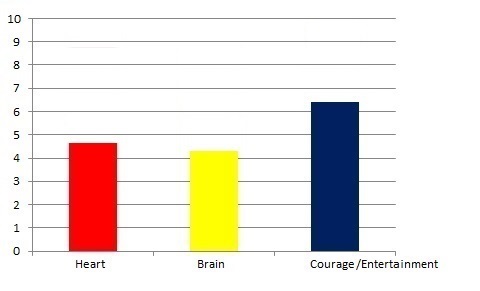
Main Page
Film Festivals
______________________________________________________
Avi Offer
The NYC Movie Guru
themovieguru101@yahoo.com
Privacy Policy
|

